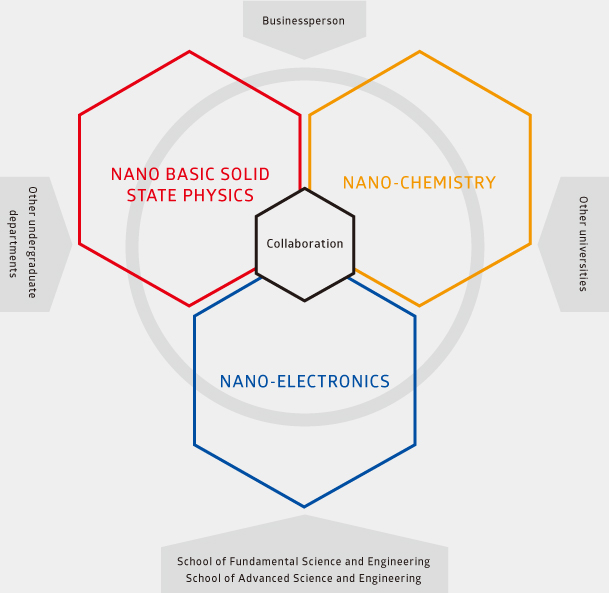For Creators of Future Industries
The Department of Nanoscience and Nanoengineering offers studies in an interdisciplinary field. It consolidates the fields such as electrical, chemical, and material science, and covers a wide range from fundamentals to applications.
Students come from this school, such as department of Electronic and Photonic Systems, Applied Chemistry, Physics, Applied Physics, Electrical Engineering and Bioscience, and Life Science and Medical Bioscience, as well as other fields and other universities. The advanced placement program is also offered.
Students can freely select research advisors upon a greement of the advisor, irrespective of the previous department, previousresearch field, and subjects elected in the entrance exams.

The Department of Nanoscience and Nanoengineering includes three divisions.
Interdisciplinary education is conducted through cutting-edge research by the respective divisions.
NANO-ELECTRONICS
Nanoelectronics Division
This division’s goal is not limited to IT technology,such as devices for processing minimum information carriers like as electrons and photons, but encompasses the application of such technology in fields such as environmental science and biotechnology.
Physical, chemical, and biological phenomena are analyzed at the nano scale in fundamental study of electrical engineering, and research is conducted regarding engineering applications.
NANO-CHEMISTRY
Nanochemistry Division
The research topics of this division include utilizing chemical approaches such as precision synthesis and reaction control to create nanomaterials with structures and functions that are controlled at the molecular level, the development of novel reaction processes for that purpose, and research into various device systems that make use of nanomaterials developed.
NANO BASIC SOLID STATE PHYSICS
Fundamental Nanoproperties Division
The nano scale is where quantum effects become significant, and is also the limiting extreme of artificial control .
The goals of this division are to elucidate the structure, properties, and phenomena of nanoscale materials at the quantum mechanical level, and to attain the scientific knowledge required to artificially control such structure and phenomena.